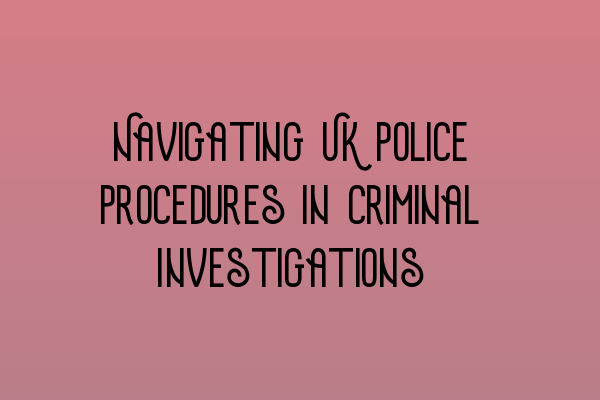Navigating UK Police Procedures in Criminal Investigations
Welcome to our blog post on navigating UK police procedures in criminal investigations. As SQE Criminal Law & Practice Law UK solicitors, we understand the importance of having a clear understanding of police procedures and how they can impact criminal investigations. Whether you are a student preparing for the SQE 1 or SQE 2 exams, or a legal professional looking to expand their knowledge, this article will provide you with valuable insights.
The Role of the Police
The police play a crucial role in criminal investigations in the UK. They are responsible for maintaining public order and safety, preventing and detecting crime, and gathering evidence to prosecute offenders. Understanding the powers and procedures of the police is essential for anyone involved in criminal law.
If you are preparing for the SQE 1 exam, make sure to check out our SQE 1 Practice Exam Questions to test your knowledge on police procedures and other relevant topics. Practicing exam-style questions can help you familiarize yourself with the format and assess your understanding of the subject matter.
Police Powers
The police have various powers granted to them under UK law to carry out their duties effectively. These powers include the power of arrest, the power to stop and search individuals, and the power to seize and retain evidence. It is important to have a solid understanding of these powers and the legal framework that governs them.
For a more comprehensive understanding of police powers, our SQE 1 Practice Mocks FLK1 FLK2 course offers in-depth coverage of police procedures and relevant legal principles. These practice mocks will provide you with realistic scenarios to test your knowledge and help you prepare for the exam.
Investigation Process
When a crime is reported, the police initiate an investigation to gather evidence and identify the person responsible. The investigation process involves various stages, including conducting interviews, collecting witness statements, analyzing forensic evidence, and examining CCTV footage.
Our SQE 2 Preparation Courses cover the investigation process in detail, providing you with the necessary knowledge and skills to navigate criminal investigations effectively. Enroll in our courses to boost your understanding of the subject matter and increase your chances of success in the SQE exams.
Legal Obligations
During the investigation process, the police must comply with various legal obligations to protect the rights of individuals involved. These obligations include the right to legal representation, the right to be informed of the grounds for arrest, and the right to remain silent.
If you want to stay up-to-date with the latest SRA SQE exam dates, make sure to visit our SRA SQE Exam Dates page. Being aware of the exam schedule will allow you to plan your preparation and ensure you are well-prepared on the day of the exam.
Conclusion
Navigating UK police procedures in criminal investigations is essential for anyone involved in criminal law. Understanding the role of the police, their powers, the investigation process, and the legal obligations they must adhere to is crucial for success in the SQE exams and in legal practice.
At SQE Criminal Law & Practice Law UK, we offer comprehensive preparation courses for both the SQE 1 and SQE 2 exams. Whether you are just starting your journey or looking to enhance your knowledge, our courses will provide you with the necessary tools to excel in your legal career.
